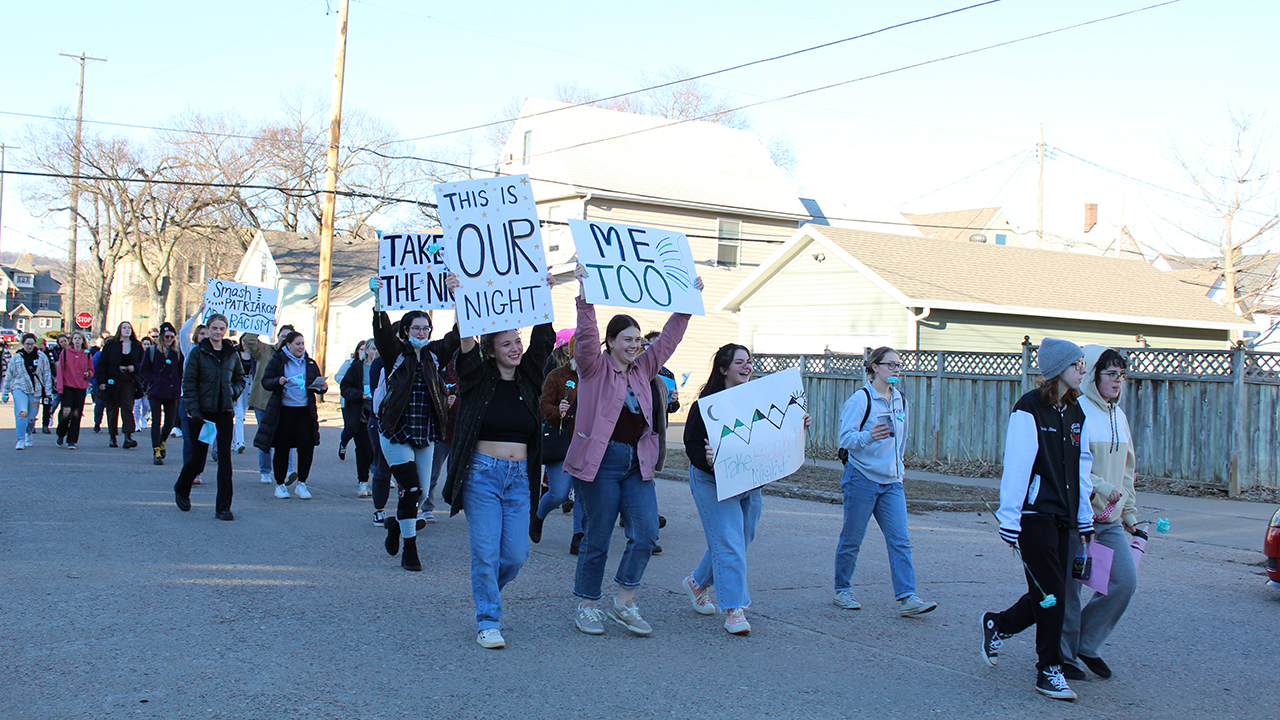
Photo credit: Heidi Hanson
The Women’s, Gender, and Sexuality Studies (WGSS) department is marking a big milestone this month.
It’s celebrating 30 years of being a minor program. One that has given students a feminist, anti-racist, anti-oppressive, and social justice lens to view the world through.
The WGSS program is hosting a celebration in honor of this anniversary as well as the retirements of its program director and an affiliated faculty member. The celebration is from 3-4:30 p.m. on Tuesday, April 18 in the Kryzsko Solarium on campus.
But the milestone is so much more than recognizing 30 years of teaching. It also recognizes 30 years of activism.
“We have been a leading program for activism for 30 years,” WGSS professor and current program director Mary Jo Klinker said.
That’s because as part of the program, a capstone is required in which students take what they’ve learned in the classroom, choose a topic they’re passionate about changing or advocating for, and then organize events or activism initiatives surrounding that topic.
Sometimes that’s through hosting events like film discussions, the Trans Day of Remembrance, a book drive for LGBT prisoners, or clothing donation drives for gender nonconforming community members. Other times it’s by becoming campus advocates for gender-based violence incidents or student leaders who work with the KEAP coalition.
One of the most notable and yearly initiatives is organizing the Take Back the Night event, which brings together the community by partnering with the Advocacy Center of Winona to address gender-based violence. The event recognizes victims and survivors of sexual violence through speakers, musicians, and a march.
“The program has been a model at WSU for active student engagement and partnership with the wider community,” professor Colette Hyman said, who originally helped begin the WGSS program. “This is most visible through the partnership with the Advocacy Center of Winona–formerly Women’s Resource Center–which has, once again [this year], received University recognition as a community partner.”
As Klinker, Hyman, and retiring program director Tamara Berg all noted, the beauty of the WGSS program is that it pairs well with any other major and adds an extra layer of world understanding to the mix.
“Our program as a minor program is something that compliments other majors by bringing that social justice lens to other workplaces,” Klinker said.
Not only does it bring understanding of the world, but also for many students it brings understanding of themselves and their own identities.
“I feel most comfortable and authentic when [I was] in my Women’s, Gender, & Sexuality Studies classes,” WSU alum Jillian Volk ’22 said. “Every class I took, I was able to express myself freely and was never afraid to speak my truth. Especially when I was struggling with trying to figure out my sexuality, that was the one place on campus I felt like I could totally be myself without being afraid of others.”
The program is also one that is constantly pushing itself to be at the leading edge of topics related to social justice by evolving other the years. Thirty years ago, it started as women’s studies, but since then has evolved, Klinker said.
“When Mary Jo was hired and we moved to become a program focused on the overlapping disciplines of women’s, gender, and sexuality studies, things really grew,” Berg said. “It’s what makes our discipline so powerful–our commitment to feminism and social justice movements as they evolve and change.”
Because of that, WSU students take with them the most up-to-date information as they head out into their careers.
“They learn critical thinking and collective activism skills that let them apply this important lens to whatever they do,” Berg said.
Although the WGSS program has led to meaningful experiences for many students, it’s also been impactful to the professors who have taught classes for it.
“It impacts me to continue to build queer and feminist safe spaces in the community,” Klinker said.
For Berg and Hyman–who are both retiring this year–the impact has also been personal and profound. Berg said it’s helped inform her career and life. Hyman said the community of faculty who supported her through allyship made the program possible and has been a type of support she carries with her.
As Berg and Hyman set out to retire, they look forward to continuing advocating and being involved, but in different ways. Berg plans to continue writing and working on gender-based violence issues by volunteering her time to the community. Hyman plans on finishing a book project with colleague Audrey Thayer on Indigenous women and leadership and then later finding new ways to work within the community.
With the retirement of Berg, a full-time faculty member of the program, Klinker said the program is looking to what’s next in store for the future.
“We have a commitment from WSU administration to hire and continue to build our program because they are invested in this hands-on program,” Klinker said. “It’s so exciting to be at a small state institution that supports a WGSS because social justice necessitates a gender and sexuality lens.”
